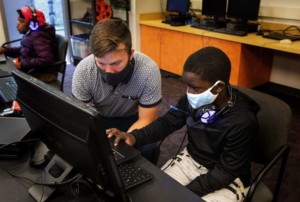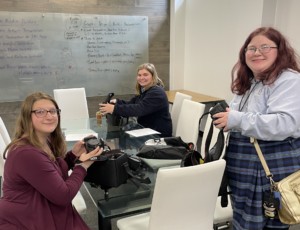Online Partnerships for Elementary Success
Becoming an online elementary teacher was a steep learning curve, even for Joyce Voelker a former principal and veteran teacher, “It took an entirely different skill set.” She was skeptical of an online elementary school, but after one year of teaching online is a wholehearted advocate after seeing the benefit to a wide span of families. “For every student, there is a different reason—behavior issues, health conditions, or students that are just a little different—but they come alive in this program and it is a godsend for these families.”
Nancy Brosnahan, Academic Administrator for the Virginia Virtual Academy (VAVA), an online school operated by K¹² Inc. (one of my digital learning advocacy partners) in partnership with Carroll County Public Schools, points to the proven benefits of starting world languages in the early elementary grades. The school uses K¹²’s Powerspeak world language program to deliver tailored language instruction. Students have a 200 day school year and can access the curriculum 365 days a year.
Every student has a learning coach at home—usually a parent but sometimes an aunt, or grandmother—and they play an active and important role. The coach receives a 100 pound shipment of books, worksheets, training videos, science materials and more at the beginning of the year. Young students don’t spend more than 20% of their time on the computer, so there is a good deal of orchestration and support required from the learning coach. Virginia requires at least 990 hours of instruction annually, so learning coaches keep a daily log online of time on task.
Through fifth grade, the instructional platform addresses the learning coach as the primary user. Starting in sixth grade, K¹² addresses the student as the primary user.
Lindsay Woods is both a K-6 teacher and part-time learning coach for some subjects for her first grade son—jobs she is able to juggle during the week with a little time shifting that sometimes includes evening history and weekend science. According to Lindsay, “Shifting to teaching online was like being a new teacher all over again,” but after a few years she loves the flexibility and time at home with her son. Lindsay credits her husband for supporting her learning coach role as well.
Lindsay and Joyce conduct periodic assessments of young readers using the Elluminate communication platform. They develop a strong relationship with students and coaches through monthly check in calls and lots of emails and phone calls in between.
Students move at their own rate. Joyce has a six year old in third grade curriculum. Some students are ahead in reading and a little slower in math. Lots of optional lessons built in if more help/time needed. VAVA uses MARK¹², K¹²’s reading recovery program for grades three to five. For struggling readers, it provides immediate feedback to learning coaches and suggests daily adjustments.
Nancy appreciates the amount of collaboration between online teachers. Rather than being isolated, Nancy and her colleagues think of teaching online as a team sport and actively take advantages of mutual strengths.
Online students maintain lots of connections; some are in book clubs, some have pen pals, and some participate in community sports, and clubs. They all use Study Island for state test preparation.
All three of them work out of a home office with a K¹² provided laptop that occasionally goes on the road with them. About half of their time is prescheduled with calls, synchronous instruction, class meetings, and other online meetings; the other half is tutoring, coaching, grading work, and trouble-shooting. Joyce, Nancy, and Lindsay work harder than ever, but they love the flexibility, the collaboration, and the difference they make for their students.
Related articles
- Online Partnerships for Elementary Success (edreformer.com)
- Tom Vander Ark: Online Partnerships for Elementary Success (huffingtonpost.com)
- Increasing ELL Population Drives Learn English Development: New EducationCity.com Product Builds Confidence and Fosters Independence (prweb.com)
- Imagine Learning Begins After School Tutoring Service (prweb.com)
- Premier’s education goals questioned (cbc.ca)








Ed Jones
Tom, you've been doing some pretty fine writing. (The more for a minerals engineer/mba type!). Great article; revealing portrait of how this works for kids and teachers.